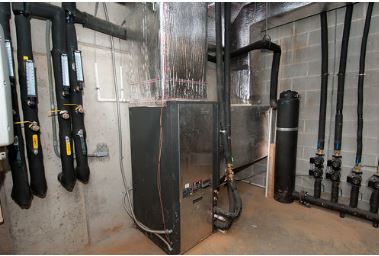Geothermal energy is a clean, renewable source of energy that has been in use for more than 50 years. A geothermal heat pump can allow you to harness the power of geothermal energy for your home. Geothermal heat pumps rely on the nearly constant underground temperature of the Earth, which makes them suitable for use in almost any climate. Additionally, geothermal systems provide the ultimate in home comfort, safety, and energy savings. Discover the benefits of using geothermal energy to heat and cool your home.
Geothermal Systems Pay for Themselves Over Time
Image via Flickr by USDAgov
The four main types of geothermal systems include horizontal loop, vertical loop, well-water loop, and pond-and-lake loop constructions. Initial cost varies from system to system, but in general, the initial purchase and installation costs of a geothermal system are much higher than a traditional HVAC system.
However, geothermal systems can pay for themselves by saving you money on energy bills. Also, geothermal heat pumps last much longer than traditional HVAC system components. Since geothermal systems have so few moving parts, they require minimal maintenance and less frequent repairs.
Geothermal Systems Are Eco-Friendly Operations
The temperatures on the Earth’s surface can vary from season to season, but the temperature below the surface is very stable. During the winter, the ground is warmer than the air above it, and during the summer, the ground is cooler.
A geothermal heat pump uses this temperature difference to heat and cool air for your home. Geothermal systems don’t use any fossil fuels and produce much less carbon dioxide than traditional energy systems. By installing a geothermal heat pump, you can reduce greenhouse emissions amounting to the equivalent of planting 750 trees.
Your Household Benefits From Both Healthy Air and Safety
Since geothermal heat pumps don’t recycle air, they remove humidity and purify the air much more efficiently than a traditional HVAC system. Drier, cleaner air is a significant benefit for those who suffer from allergies and asthma. Geothermal heat pumps don’t burn fuel, and they don’t produce poisonous carbon monoxide, nor are they at risk for explosions. Geothermal heat pumps have no outdoor units like an air conditioner, and they operate much more quietly.
You Receive a Constant Supply of Hot Water
Installing a desuperheater in your geothermal heat pump can increase your energy savings. A desuperheater collects extra heat from your geothermal heat pump to produce hot water. This hot water can be stored in your home’s water heater. A desuperheater will allow you to always have hot water when you need it without using fossil fuels to heat the water. In fact, during the summer months, a desuperheater may supply all of your hot water needs for free.
Geothermal systems feature many perks. Energy bills are much lower for geothermal systems due to their high efficiency. Your home can be more comfortable, quieter, and safer than a home with a traditional HVAC system. A geothermal heating and cooling system also benefits the Earth by reducing greenhouse gas emissions and your carbon footprint. If you are ready to make the switch to a geothermal system, contact HVAC professionals such as Berkeley Heating and Air Conditioning. These specialists can help you decide which geothermal system is best for your home and your budget.










